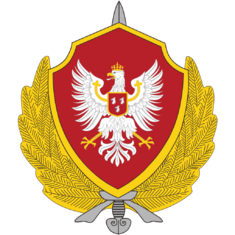KDB (Vozh): Difference between revisions
Jump to navigation
Jump to search
(Created page with "{{Infobox law enforcement agency | agencyname = Royal Committee For State Security | nativename = ''Karalieŭski Kamitet Dziaržaǔnaj Biaspieki'' | nativenamea...") |
No edit summary |
||
| (7 intermediate revisions by 2 users not shown) | |||
| Line 1: | Line 1: | ||
{{Region icon Heliste}} | |||
{{Infobox law enforcement agency | {{Infobox law enforcement agency | ||
| agencyname = Royal Committee For State Security | | agencyname = Royal Committee For State Security | ||
| Line 9: | Line 10: | ||
| patch = | | patch = | ||
| patchcaption = | | patchcaption = | ||
| logo = | | logo = [[File:Insignia of the KKDB.png|235px]] | ||
| logocaption = | | logocaption = | ||
| badge = | | badge = | ||
| Line 19: | Line 20: | ||
| mottotranslated = | | mottotranslated = | ||
| formedmonthday = February 19 | | formedmonthday = February 19 | ||
| formedyear = | | formedyear = 1944 | ||
| preceding1 = Karalieŭski Kamisaryjat Unutranych Spraŭ (KKUS) | | preceding1 = Karalieŭski Kamisaryjat Unutranych Spraŭ (KKUS) | ||
<!-- (...up to 6...) --> | <!-- (...up to 6...) --> | ||
| dissolved = | | dissolved = | ||
| superseding = | | superseding = | ||
| employees = State secret - greater than | | employees = State secret - greater than 350,000 | ||
| volunteers = | | volunteers = | ||
| budget = Classified | | budget = Classified | ||
| Line 125: | Line 126: | ||
}} | }} | ||
''' | The '''Royal Committee for State Security of the United Kingdoms of Vozh''' ({{wpl|Belarusian Language|Vozhsk}}: ''Karalieŭski Kamitet Dziaržaǔnaj Biaspieki'') ('''KKDB''') is the national intelligence agency of [[Vozh]] | ||
It is the successor to the 20th century KKUS, which was dissolved | It is the successor to the 20th century KKUS, which was dissolved in 1944 as the need for a more modern intelligence-gathering apparatus became apparent. Over time the KKDB has seen its role expand into the realm of intelligence gathering, counter-espionage, federal law enforcement, border control, and disaster relief. The agency is now one of the largest government employers in the country, and has pioneered new law enforcement and emergency response protocols that have seen widespread international adoption. | ||
==History== | ==History== | ||
{{template:Vozh Navbox}} | |||
[[Category:Vozh]] | |||
[[Category:Heliste]] | |||
Latest revision as of 11:39, 2 July 2023
| Royal Committee For State Security Karalieŭski Kamitet Dziaržaǔnaj Biaspieki | |
|---|---|
 | |
| Common name | Committee For State Security |
| Abbreviation | KKDB |
| Agency overview | |
| Formed | February 19, 1944 |
| Preceding agency |
|
| Employees | State secret - greater than 350,000 |
| Annual budget | Classified |
| Jurisdictional structure | |
| Operations jurisdiction | Vozh |
| General nature | |
| Operational structure | |
| Headquarters | Mohilev |
| Elected officer responsible |
|
| Agency executive |
|
The Royal Committee for State Security of the United Kingdoms of Vozh (Vozhsk: Karalieŭski Kamitet Dziaržaǔnaj Biaspieki) (KKDB) is the national intelligence agency of Vozh
It is the successor to the 20th century KKUS, which was dissolved in 1944 as the need for a more modern intelligence-gathering apparatus became apparent. Over time the KKDB has seen its role expand into the realm of intelligence gathering, counter-espionage, federal law enforcement, border control, and disaster relief. The agency is now one of the largest government employers in the country, and has pioneered new law enforcement and emergency response protocols that have seen widespread international adoption.